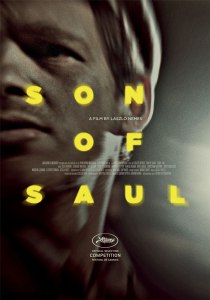 The foreign drama “Son of Saul” finds a way to give us yet another new look at the Holocaust, but its innovation is in finding the imminent danger in every moment of these prisoners’ lives. Director Laszlo Nemes shuttles us into the back of the head of Saul Auslander (Geza Rohrig) and shows us things only in his immediate field of vision. There’s a palpable, hushed tension coursing through every scene, and yet it remains impossible to foresee the threat even seconds ahead.
The foreign drama “Son of Saul” finds a way to give us yet another new look at the Holocaust, but its innovation is in finding the imminent danger in every moment of these prisoners’ lives. Director Laszlo Nemes shuttles us into the back of the head of Saul Auslander (Geza Rohrig) and shows us things only in his immediate field of vision. There’s a palpable, hushed tension coursing through every scene, and yet it remains impossible to foresee the threat even seconds ahead.
Saul is a Sonderkommando, a Jewish prisoner of Hungarian descent forced by the Nazis to work in the Auschwitz crematoriums. In the film’s opening scene, hundreds of bodies strip naked, blurred to us as he quickly works in a haze. After the swarm of prisoners has been shuttled into the gas chamber, he immediately goes to work collecting clothes as though he’s done it a dozen times before. He’s then forced to clean the “pieces” from the killing floor and put “it” out of the way. A young boy survives the gas chamber and quickly gets snuffed out by the Nazi guard. But when the boy is delegated for an autopsy, Saul makes a deal with the doctor to give the boy a proper burial, believing the boy to be his son. “Son of Saul” follows him over two intense days as he works to find a rabbi who can bless the burial.
Saul’s determination and conviction is heart-wrenching in a movie where all the prisoners know they’re in constant danger and remain brash, defensive and only looking out for themselves. Saul however carries a defeated look on his furrowed brow, and the film tests his psychological resolve as he defies the odds and logic in order to complete this symbolic gesture. “You failed the living for the dead,” one prisoner says to him.
The film is violent and intense not strictly because of the setting but because the camera work, all done in a classical aspect ratio, is so volatile. The extended takes tethered closely to Saul’s back feel like what the gimmicky, yet virtuoso nature of “Birdman’s” cinematography could be. One scene stuns with a fiery backdrop that in the camera’s constant close-ups throws everything into intimate chaos, and the closing revolt scene is reminiscent of “Children of Men’s” warzone long take.
“Son of Saul” is a Holocaust movie unlike you’ve ever seen before, but that’s because it specifically plays with how closely you witness this horror.
4 stars
This film is a modern masterpiece for reasons explained in my own review. Drop in for a read if you can. I’m now following your blog.